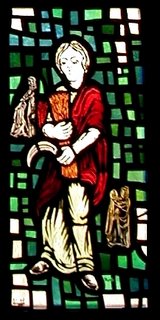 I still remember the vivid impact that the stained glass windows had on me when I worshipped at the Highland Baptist Church in Louisville for several months. This church found that its old, clear windows were cracked and badly in need of replacement. Before surging ahead with swapping the old for the new, same style, the members had a conversation and decided to put in some coloured glass.
I still remember the vivid impact that the stained glass windows had on me when I worshipped at the Highland Baptist Church in Louisville for several months. This church found that its old, clear windows were cracked and badly in need of replacement. Before surging ahead with swapping the old for the new, same style, the members had a conversation and decided to put in some coloured glass.“These windows were installed in 1971-72,” I quote from the web site article, “and are an artistic expression of the church's gospel. The windows, beginning with those closest to the pulpit, follow the spectrum of the rainbow in their colors - red, gold, green, blue and violet: enveloping the worshipers with the colors of the rainbow, reminding the believers that they are the objects of Covenant love.”
“The ten windows around the bottom of the nave take up the theme of Hebrews 12:1, ‘Wherefore seeing we also are compassed about with so great a cloud of witnesses, let us lay aside every weight, and the sin which doth so easily beset us, and let us run with patience the race that is set before us.’ They depict the Apostles and representative saints who have preceded the Church of the present.”
“The gleaming stained-glass windows of Highland Baptist Church remind us that we continue a living tradition beginning with the saints of the Bible. At Highland, too, we are heirs to a strong heritage, from the 27 people who formed the church at a house meeting in 1893 to the hundreds of members today who gather here regularly for worship, study, fellowship and other gospel work.”
“The story of Highland Baptist Church is told in a new book, “The Cloud of Witness,” produced by the History Task Force with text by Peter Smith and photos by Bill Luster, both Highland members and experienced journalists. Copies are $29.95 by contacting Betsy Neill in the church office.”
Each Sunday when I worshipped in that beautiful sanctuary I loved looking first at the central window of the victorious Lord. Then as my eyes slowly swept down the sides of the church there were the greats of the Hebrew story—Rachel and Esther, Samuel and Jeremiah. Further down were some characters from the church soon after its birth—Andrew and Thomas, Dorcas and Lydia. Then providing a sense of connection with the church down through the centuries were Augustine, Hus and Wesley and then the more recent Baptist figures of Hubmaier and Rauschenbusch. Then John Oncken, Lottie Moon and a host of others—sixty men and women of faith.
These images gave me a sense of being surrounded by a great congregation of worshippers who though dead were still speaking and more alive than ever. It is an inspirational truth that puts your life in perspective and urges you on, the same way that athletes are clapped on by those in the grandstand.
Image: One of the stained glass panels—Ruth.
Source: Highland Baptist Church web site
http://www.hbclouky.org/modules.php?op=modload&name=Sections&file=index&req=viewarticle&artid=35&page=1
 This season of the year and on 1 November the Christian Church is celebrating All Saints day. Writing on the theme of what has been called ‘the communion of the saints’, F W Boreham tells this story:
This season of the year and on 1 November the Christian Church is celebrating All Saints day. Writing on the theme of what has been called ‘the communion of the saints’, F W Boreham tells this story: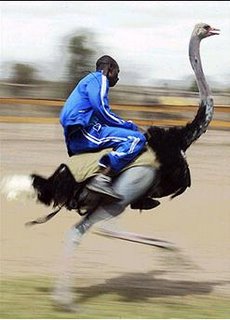 Blogger.Com which hosts this and my other web sites has been having problems of late.
Blogger.Com which hosts this and my other web sites has been having problems of late. It was Al Gore who said: “Airplane travel is nature's way of making you look like your passport photo.”
It was Al Gore who said: “Airplane travel is nature's way of making you look like your passport photo.” There’s an English idiom that says: “The Devil is in the detail.” By this it is meant that sometimes the small things in our plans and schemes and often the things we overlook are the things that can cause serious us problems.
There’s an English idiom that says: “The Devil is in the detail.” By this it is meant that sometimes the small things in our plans and schemes and often the things we overlook are the things that can cause serious us problems.


 There’s something new on the supermarket shelves in the UAE. We have recently seen the launch of Camelicious—camel milk—which is available now in UAE supermarkets in 250ml, 500ml, 1 litre and 2 litre containers. They have been working on this project for the last 20 years and have now smoothed out all the humps they had encountered in production, manufacturing and marketing.
There’s something new on the supermarket shelves in the UAE. We have recently seen the launch of Camelicious—camel milk—which is available now in UAE supermarkets in 250ml, 500ml, 1 litre and 2 litre containers. They have been working on this project for the last 20 years and have now smoothed out all the humps they had encountered in production, manufacturing and marketing. I usually am stimulated when I read the articles posted on
I usually am stimulated when I read the articles posted on  I am yet to see the popular documentary, An Inconvenient Truth, based on the lecture by former US Vice President Al Gore about global warning, but on a flight to SE Asia this week I read an interesting article about its origins.
I am yet to see the popular documentary, An Inconvenient Truth, based on the lecture by former US Vice President Al Gore about global warning, but on a flight to SE Asia this week I read an interesting article about its origins. The Russian novelist, Andrei Makine, has lived in France since the1980’s and writes superbly about the Stalin era and its aftermath.
The Russian novelist, Andrei Makine, has lived in France since the1980’s and writes superbly about the Stalin era and its aftermath.
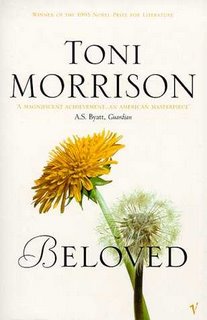 In Toni Morrison’s book, Beloved, there is this poignant statement about the central character:
In Toni Morrison’s book, Beloved, there is this poignant statement about the central character:

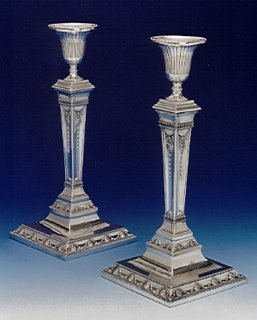

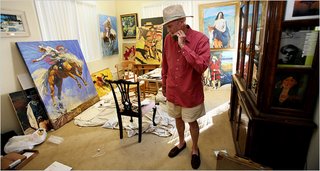
 In a famous court case in the United States a man was tried and found guilty and sentenced to death.
In a famous court case in the United States a man was tried and found guilty and sentenced to death. I'm a counsellor who helps coordinate support groups for visually-impaired adults. Many participants have a condition known as macular degeneration, which makes it very difficult for them to distinguish facial features. I had just been assigned to a new group and was introducing myself.
I'm a counsellor who helps coordinate support groups for visually-impaired adults. Many participants have a condition known as macular degeneration, which makes it very difficult for them to distinguish facial features. I had just been assigned to a new group and was introducing myself.